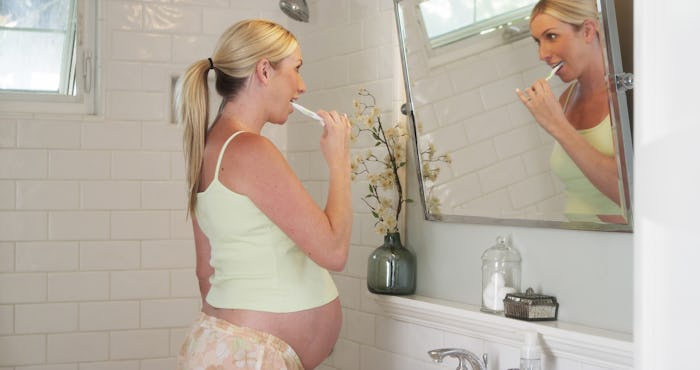Life

It's Time To Talk About Bleeding Gums When You're Pregnant
If you thought nothing could be more unrelated than your dental health and your pregnancy, you could be in for a most unpleasant surprise. When you found out you were pregnant, you were probably prepared for the usual: morning sickness, frequent urination, and backache. Unfortunately, there's plenty of sh*t the books just don't tell you about. That's why it's time we talk about your gums bleeding when you're pregnant.
Excuse me? What? Yep. I can tell you from experience that bleeding gums are one of the most unexpected of all the pregnancy pains and discomforts. I pride myself on my oral hygiene. I dutifully visit the dentist twice a year, and before I delivered my daughter I'd never had a cavity in my permanent teeth (baby girl changed that by apparently leeching the calcium out of my teeth so, you know, thanks kid). So you can imagine my displeasure when, during my second trimester (which is apparently when this garbage usually rears its ugly head), my usual brushing resulted in blood in my bathroom sink. You better believe I gave it a serious "what the hell?" followed by a Google. When you're pregnant, bleeding of any kind isn't only unpleasant, it's scary. And, no, it doesn't matter where that bleeding is coming from.
It turns out that bleeding gums during pregnancy are actually pretty common. According to BabyCenter, about half of all pregnant women experience red, swollen, tender gums. So if your gums are bleeding when you brush or floss, you're in good company. The condition is known as pregnancy gingivitis, and it's a blessedly mild form of gum disease (still ew, I know).
If you're anything like me, seeing red on your toothbrush has you seeing red and wanting to know what the AF is causing it. According to What to Expect, 15 weeks is about when your mucus membranes start to swell. This, in turn, causes your gums to swell, and swollen gums bleed more easily. You can thank your surging hormones for that, along with pretty much every other pregnancy pain in the ass. Those bastards hinder your body's normal response to bacteria, which can lead to periodontal infections. The American Pregnancy Association (APA) says the increase in blood flow is also to blame.
Other possible culprits (that cause or exacerbate your condition) include:
- Changes to your eating habits. Increase in sugar and carb intake? Who, me? Yeah, so it turns out that extra chocolate milkshake you're mainlining on the daily can create a hostile oral environment. Great.
- Reaction to morning sickness. Even if you're not puking anymore, your gums could still be reeling from those frequent acid baths you gave them every time you lost your lunch.
- Pregnancy aversions. For some poor souls, the minty taste of toothpaste makes them nauseated. A friend of mine could only use her kid's pink Barbie toothpaste. Otherwise, she'd be like the many others whose nausea forced them to avoid brushing.
- Smoking. Yet another reason to quit.
- Diabetes. Diabetes worsens gum conditions, putting you at additional risk.
Should you be worried? Probably not. According to BabyCenter, chances are that this particular condition will not be harmful to you or your baby. Pregnancy gingivitis can, however, be a precursor to severe gum disease. That could possibly put you at risk for preterm birth, low birth weight, or preeclampsia (although studies are inconclusive). Watch for extreme symptoms such as toothache, painful gums, receding gums, persistent bad breath, loosening teeth, or growths in your mouth. In those cases, you'll want to call your dentist ASAP.
Just because you don't need to get too worked up about bleeding gums doesn't mean you shouldn't do anything about them. You definitely don't want your condition to progress into something worse (like the above), so above all, maintain proper oral hygiene. Colgate recommends brushing twice a day with a soft-bristled brush and fluoride toothpaste, as well as flossing daily. It's a good idea to swish with some mouthwash afterward, too, while you're at it. According to Mother&Baby, you should limit sugary or acidic food and drinks (RIP, chocolate milkshake, we hardly knew ye).
Don't avoid your dentist just because you're pregnant. Routine check-ups and cleanings are essential. Just make sure they know you are pregnant so they don't do any X-rays. Finally, make sure you're getting enough of those teeth- and gum-friendly nutrients, vitamin C and calcium. The APA suggests adding vitamin A to your arsenal, as well as gargling with sea salt. Grandma always prescribed salt water for everything (sore throat, sinus infection, sucking chest wound), so, well, I'm inclined to believe it.
There's no getting around the fact that pregnancy gingivitis sucks. And when it starts, you can expect it to end... after delivery. Who knew the whole process of having a baby would be such a sh*tshow, right? Chalk it up to "one more thing," rest easy knowing that if your gums were OK before pregnancy, they'll likely be find after, and, dude, take the time to brush your teeth.
Check out Romper's new video series, Bearing The Motherload, where disagreeing parents from different sides of an issue sit down with a mediator and talk about how to support (and not judge) each other’s parenting perspectives. New episodes air Mondays on Facebook.